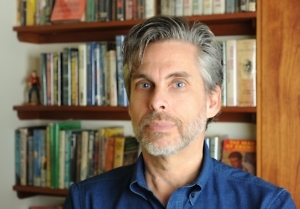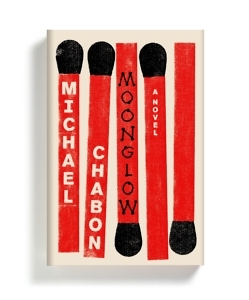Moonglow, Michael Chabon’s new novel, plays a coy game with readers, inviting them to believe that the narrator is the author himself. The story is told by an unnamed man whose biography appears to parallel Chabon’s own—Jewish novelist born in the early ‘60s, divorced, kids aplenty with his second wife; there’s even a model-rocket purveyor known as the Chabon Scientific Company—though Chabon has said the events of the novel are wholly invented. The central character is the narrator’s grandfather, also unnamed, and as the story progresses, details emerge that make Moonglow something far different—stranger and more satisfying—than any autobiographical tale.

The novel’s conceit seems plausible: the grandfather, dying from bone cancer and looped on Dilaudid, summons his grandson and begins to reveal his life story, beginning with his Depression boyhood in Philadelphia and continuing through the horrors of Germany in World War II to his marriage with an equally damaged French woman. Previously reluctant to discuss the darker elements of his past, he unleashes his memories, one after the other. “It was as if he had been waiting for my company,” the narrator says, “but I believe now that he simply knew he was running out of time.” According to the unnamed grandson, “the recollections emerged in no discernible order,” but as the episodes unfold, a pattern emerges. What starts as a picaresque tale about a resourceful scamp evolves into a tragic love story and a family epic. Like Chabon’s The Yiddish Policeman’s Union (2007), Moonglow explores the lingering psycho-social damage inflicted by the Holocaust.
The episodes set in war-time Germany contain elements of the grotesque and the absurd, often side-by-side. Recruited into the Office of Strategic Services by Wild Bill Donovan himself, the grandfather is sent on Operation Paperclip to locate German scientists who worked in the Nazi rocket program, convert them into U.S. assets, and—equally important—keep them from the Russians. The grandfather has a passion for rockets himself, but that doesn’t keep him from developing a life-long detestation for Werner von Braun, “the literate, Dunhills-smoking, Triple-Sec drinking” former Nazi now “living happily in Huntsville, Alabama.”
The characters of Moonglow find refuge in fantastic worlds, alternate realms that relieve the drudgery and suffering of this one. As a boy, the grandfather devours sci-fi adventures; the launch of Sputnik inspires him to envision travel to distant planets. When he first meets the grandmother, they dream of escaping earth’s heavy burdens: “I want to fly to the Moon,” she tells him, to which the grandfather confidently responds, “Sure thing … I’ll figure it out.” In Baltimore after the war, the grandmother hosts a local television show, The Crypt of Nevermore, where she dresses like a vampire and tells gothic tales of horror, an evocative performance that she hopes will quiet her terrible memories.
 The sequences that take place in the decade after the war are darker in tone. The grandfather works hard to establish himself in the burgeoning field of rocket science, but his long hours at the office blind him to problems at home. His wife, who was a mother and widow at seventeen and was fortunate to have survived the final solution, is alluring and damaged in equal measure. She keeps demons at bay through discipline and distraction, but sometimes the howling beasts overwhelm her. Their daughter, the narrator’s mother, develops a knack for shutting down completely when stress threatens to shatter the family’s precarious serenity.
The sequences that take place in the decade after the war are darker in tone. The grandfather works hard to establish himself in the burgeoning field of rocket science, but his long hours at the office blind him to problems at home. His wife, who was a mother and widow at seventeen and was fortunate to have survived the final solution, is alluring and damaged in equal measure. She keeps demons at bay through discipline and distraction, but sometimes the howling beasts overwhelm her. Their daughter, the narrator’s mother, develops a knack for shutting down completely when stress threatens to shatter the family’s precarious serenity.
Chabon depicts depression primarily from the outside, in the grandfather’s search for clues to his wife’s mental state. “If she brought him coffee in bed, that was a good sign,” Chabon writes. “If there were cut flowers in the vases and jars; if the flowers were fresh: good signs. Empty vases were bad and dead flowers worse.” Despite the obstacles they face, their personalities complement each other: “She was always threatening rain; he had been born with an umbrella in his hand.”
Occasionally the narrator switches to the grandmother’s perspective and, with ominous detail, describes their home in Baltimore as it appears to a woman trying to ward off collapse. Similar to Churchill’s black dog, the embodiment of the grandmother’s depression is “the Skinless Horse,” a nightmarish image that lurks on the periphery of her perception: “At all times, alone or in company, she fought to avert her face from windows that overlooked the hickory tree. When her strength failed, the Skinless Horse would be there, sitting on one of the lower branches, baring its square teeth.” Chabon’s novel belongs to a growing shelf of recent fiction that moves mental illness from the wings to center stage. Like Adam Haslett’s Imagine Me Gone and Hanya Yanagihara’s A Little Life, Moonglow treats depression as a personal affliction that affects everyone nearby.
Chabon is a naturally comic writer, and Moonglow does not remain clouded in anguish. The scenes of the grandfather, now a widower, retired in Florida contain humorous set pieces involving the protocol of senior-citizen dating and the grandfather’s vigilante hunt for a cat-eating python. Life gives, and it takes away; in Chabon’s world, the yin and yang exist in dynamic equilibrium, a cosmic balance reflected at the sentence level. The grandfather sees his daughter, traumatized by her mother’s mania, and wonders “if the bigger misfortune was to have the crazy woman for a mother, or the father who was crazy enough to love her.”
Moonglow offers the warp and woof of reality while capturing elements of fantasy, when characters transcend adversity and escape to “a city on the Moon” where they can find an alternative peace.

Sean Kinch grew up in Austin and attended Stanford. He earned a Ph.D. from the University of Texas. He now teaches English at Montgomery Bell Academy in Nashville.
Tagged: Fiction, Salon@615 series





